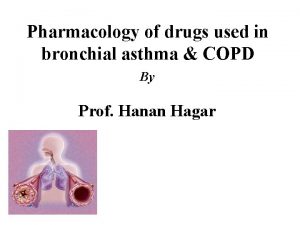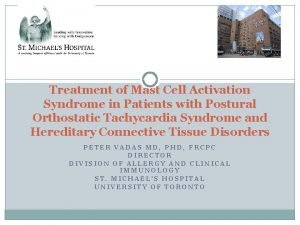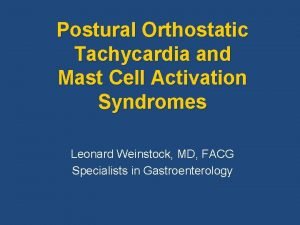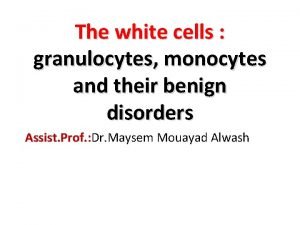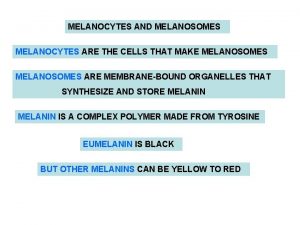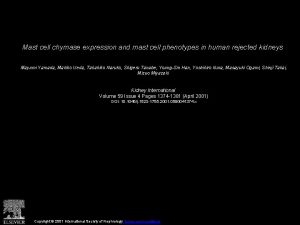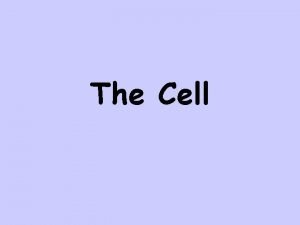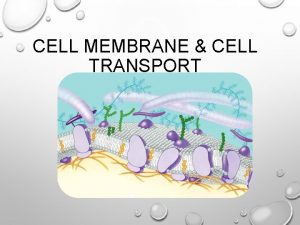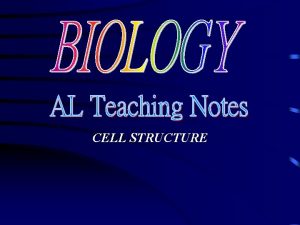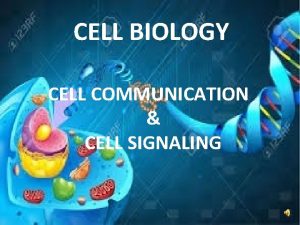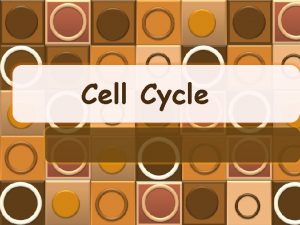Mast Cell Humraj Singh Role of the Mast














- Slides: 14

Mast Cell Humraj Singh

Role of the Mast Cell in the Body q The mast cell is a type of a white blood cell derived from the mesodermal cell lineage and part of the immune system that is crucial to the body’s inflammatory response to damage q It resides in the skin and lining of organs and carries out its function by releasing chemical signals which fight the damage and recruit other defense molecules of the immune system to the site of damage Histamine Tumor Necrosis Factor (α) Prostaglandin

Key Organelles Responsible for the Functioning of the Mast Cell q. Vesicles (known as the secretory granules in this case) q. Ribosomes q. Endoplasmic Reticulum (both rough and smooth) q. Golgi Complex


An Analogy for How the Mast Cell Functions q. Imagine a fire that needs to be taken care of by firefighters…

Disorders, Diseases, and Conditions From Mast Cell Functioning Deficiences q. Mast Cell Tumor (mastocytoma) q. Allergic Reactions q. Autoimmune Diseases q. Sepsis

Question #1 q In which of the following categories of cells does the mast cell fall into? a. Red Blood Cell b. White Blood Cell c. Muscle Cell d. Nerve Cell e. Skin Cell

Question #1 q Which of the following categories of cells does the mast cell fall into? a. Red Blood Cell b. White Blood Cell c. Muscle Cell d. Nerve Cell e. Skin Cell

Question #2 q In which the following organs of the body is a mast cell is most likely to reside? a. Brain b. Muscles c. Skin d. Heart e. Spinal Cord

Question #2 q In which the following organs of the body is a mast cell is most likely to reside? a. Brain b. Muscles c. Skin d. Heart e. Spinal Cord

Question #3 q Which of the following organelles is not vital to the mast cell’s primary function? a. Vacuoles b. Golgi Apparatus c. Vesicles d. Rough Endoplasmic Reticulum e. Smooth Endoplasmic Reticulum

Question #3 q Which of the following organelles is not vital to the mast cell’s primary function? a. Vacuoles b. Golgi Apparatus c. Vesicles d. Rough Endoplasmic Reticulum e. Smooth Endoplasmic Reticulum

Question #4 q If someone starts getting itchy and watery eyes during the spring due to pollen, which of the following best explains what happened in regard to the mast cells of that person? a. Their mast cells underwent apoptosis. b. Their mast cells targeted the skin cells of their own body. c. The pollen caused the mast cells to transform into mucus cells. d. The pollen bonded to the mast cells, although they’re truly harmless, and caused unnecessary inflammation. e. The mast cells underwent rapid mitosis.

Question #4 q If someone starts getting itchy and watery eyes during the spring due to pollen, which of the following best explains what happened in regard to the mast cells of that person? a. Their mast cells underwent apoptosis. b. Their mast cells targeted the skin cells of their own body. c. The pollen caused the mast cells to transform into mucus cells. d. The pollen bonded to the mast cells, although they’re truly harmless, and caused unnecessary inflammation. e. The mast cells underwent rapid mitosis.
 Method statement for tower crane installation
Method statement for tower crane installation Raj birk
Raj birk Theophylline mechanism of action
Theophylline mechanism of action Theophylline uses
Theophylline uses Vkc vs akc
Vkc vs akc Classification of antitussive
Classification of antitussive Mast cell stabilizers
Mast cell stabilizers Mast cell activation syndrome
Mast cell activation syndrome Ivig for mcas
Ivig for mcas Mast cell tumor german shorthaired pointer
Mast cell tumor german shorthaired pointer Mast cell activation disorder
Mast cell activation disorder Alder reilly
Alder reilly Mast cell progenitor
Mast cell progenitor Luc montagnier
Luc montagnier Intraembryonic mesoderm derivatives
Intraembryonic mesoderm derivatives



